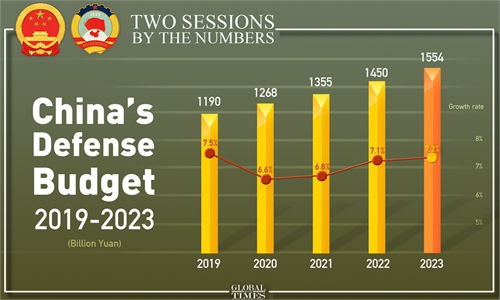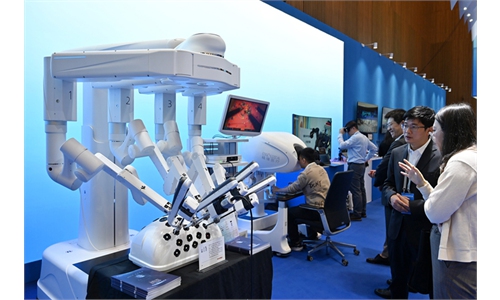
AI Photo:VCG
China will launch an artificial intelligence (AI) Plus initiative to promote the innovative development of digital economy, according to a government work report submitted on Tuesday to the national legislature for deliberation.
China will step up research and development (R&D) and application of big data and AI, launch an AI Plus initiative, and build digital industry clusters with international competitiveness, read the report.
The AI Plus initiative will become a significant part in bolstering the high-quality development of the digital economy, as it will promote the in-depth integration of AI and the real economy by deepening the research and application of AI technology and inject new impetus into China's high-tech industry and economic development, Wang Peng, an associate researcher at the Beijing Academy of Social Sciences, told the Global Times on Tuesday.
Wang noted that the initiative will help promote the industrial upgrading in key sectors such as industry, agriculture, service industry and other fields. The initiative can accelerate the wide application of AI technology in these sectors with improved production efficiency and product quality, while advancing the industrial progress to high-end and intelligent development.
Wang noted that the AI Plus initiative will also help cultivate new economic growth points by attracting more investment and talent in a bid to propel the industrial development as well as the whole economic expansion. Wang added that the initiative is conducive to enhance China's international competitiveness in science and technology as it will strengthen national AI research and application.
Amid China's rapid development in emerging and high-tech industries, AI has become a focal point for this year's two sessions, with the deputies to the 14th National People's Congress (NPC) and members of the Chinese People's Political Consultative Conference (CPPCC) National Committee submitting corresponding proposals and motions.
Liu Qingfeng, a deputy to the NPC and chairman of Chinese AI company iFlytek, proposed to formulate a development plan targeting artificial general intelligence (AGI) that can be initiated and implemented from the state level, in a bid to continuously narrow the gap between the US and China in AGI general base platforms and build China's comparative advantage in industrial applications and value creation, according to a notice sent to the Global Times on Tuesday by iFlytek.
A number of members of the CPPCC National Committee also said that in the AI arena, China should adhere to independent innovation, as the country is capable of taking a development path of large language models (LLMs) with Chinese characteristics.
Zhou Hongyi, a member of the CPPCC National Committee and founder and chairman of 360 Security Technology, said that this year's Government Work Report mentioned AI for three times and "security" for 26 times, which also coincides with the strategic development of 360 Security Technology, according to a statement sent to the Global Times on Tuesday.
Zhou said that LLM as the core engine of AI development is triggering a new industrial revolution. He said in his proposal that China should give full play to the advantages of application scenarios, promote the vertical and industrial development of LLM, and integrate LLM as productivity tools with traditional industries to empower industrial digitization.
China's AI industry has been progressing rapidly. In 2023, the scale of the country's core AI industry reached 500 billion yuan ($69.48 billion), and the number of enterprises exceeded 4,400. The market scale for AI large models is expected to reach $2.1 billion, up 110 percent year-on-year, according to data from China Center for Information Industry Development.
In addition to the above-mentioned means, the Government Work Report also highlighted a slew of measures to boost the development of the digital economy. The measures cover a wide range of aspects from formulating policies to support the sector's high-quality development, supporting platform enterprises in playing their part in promoting innovation, boosting employment, and competing on the international stage to improving basic data systems and vigorously promoting the development, openness, distribution, and utilization of data.
Global Times



